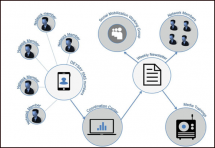Combating Rumors About Ebola: SMS Done Right
During the Ebola outbreak in Liberia in 2015, the international community quickly created a series of wide-scale social behavior change communication campaigns, a typical approach in humanitarian aid. This resulted in campaigns that bombarded local populations with massive but poorly coordinated blasts of messaging on billboards, in print, on radio and TV, through health outreach workers and community organizations, via SMS and call-in hotlines.
Internews, together with support from the Johns Hopkins Center for Communication Programs/ Health Communication Capacity Collaborative, developed a simple but critical new tool — DeySay SMS (“Dey Say” refers to how people speak about rumors in Liberian English), which detected and managed rumors in as close to real-time as possible.
DeySay began with an SMS short code, provided by UNICEF free of charge to hundreds of health workers, NGOs and volunteers on the ground throughout Liberia. When anyone connected to the system becomes aware of a rumor, they texted it via the short code to a central coordination hub.
Once the information was collected, it was analyzed for trends and disseminated to local media partners in the field with details about the rumor so that they could work to stop its spread. When the system was fully functional, aid workers and social mobilizers in the relevant regions were put on alert so they could go door-to-door to calm anxieties and correct misinformation.
In conjunction with the rapid response system, DeySay also produced a weekly newsletter for local media throughout the country and partners on the ground. The newsletter highlighted trends in rumors and their geographic locations, and helped identify the most critical rumors at any given time. The newsletter also offered insights for local media into information gaps and challenges around Ebola and health reporting.
Source: Johns Hopkins University Center for Communication Programs, InterNews
Date of Publication: June 16, 2021
SIMILIAR RESOURCES
Tools
Examples
- Tackling the Taboo: Sexuality and Gender-Transformative Programmes to End Chlld, Early, and Forced Marriage and Unions
- Combating the Disinfodemic: Working for Truth in the Time of COVID-19
- PAHO Strategic and Operational Plan for Responding to Pandemic Influenza
- Lever les Tabous: La sexualité et les approches promouvant l’égalité des genres pour mettre fin aux unions et aux mariages d’enfants, précoces et forcés
- Rights in the Time of COVID-19 Infographic
- Rights in the Time of COVID-19: Lessons from HIV for an effective, community-led response
- How Businesses Can Invest in Women and Realize Returns
- Prevent, Detect, Respond: How Community Health Workers can Help in the Fight against COVID-19
- Systematic Literature Review on the Spread of Health-related Misinformation on Social Media
- Social Franchising: Improving Quality and Expanding Contraceptive Choice in the Private Sector

